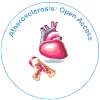当社グループは 3,000 以上の世界的なカンファレンスシリーズ 米国、ヨーロッパ、世界中で毎年イベントが開催されます。 1,000 のより科学的な学会からの支援を受けたアジア および 700 以上の オープン アクセスを発行ジャーナルには 50,000 人以上の著名人が掲載されており、科学者が編集委員として名高い
。オープンアクセスジャーナルはより多くの読者と引用を獲得
700 ジャーナル と 15,000,000 人の読者 各ジャーナルは 25,000 人以上の読者を獲得
インデックス付き
- Google スカラー
- レフシーク
- ハムダード大学
- エブスコ アリゾナ州
- パブロン
- ICMJE
役立つリンク
オープンアクセスジャーナル
このページをシェアする
抽象的な
Genetic Studies in Atherosclerosis: Unveiling Susceptibility and Personalized Risk Assessment for Heart Disease and Stroke
Lin Xu
Atherosclerosis, a condition affecting the large arteries, stands as the leading cause of heart disease and stroke. In westernized societies, it accounts for approximately 50% of all deaths. While epidemiological studies have identified crucial environmental and genetic risk factors linked to atherosclerosis, its etiological complexity has impeded progress in understanding the underlying mechanisms. Fortunately, advancements in investigative tools over the past decade, such as genetically modified mouse models of the disease, have shed light on the molecular interactions involved. These insights have revealed the intricate connections between altered cholesterol metabolism, other risk factors, and the formation of atherosclerotic plaque. We now comprehend that atherosclerosis is not merely an inevitable consequence of aging but rather a chronic inflammatory condition. This condition can turn into an acute clinical event when plaque rupture and thrombosis occur. With this improved understanding, we are better equipped to address the complexities of atherosclerosis and potentially develop more effective treatments to combat its devastating consequences.

 English
English  Spanish
Spanish  Chinese
Chinese  Russian
Russian  German
German  French
French  Portuguese
Portuguese  Hindi
Hindi